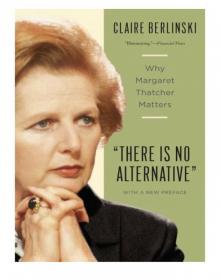- Home
- Claire Berlinski
There is No Alternative Page 4
There is No Alternative Read online
Page 4
Let us take a detour within a detour and return to Sir Bernard Ingham, to whom we have been speaking at the Institute of Directors. Ingham is the man who, more than anyone except Thatcher herself, invented the Margaret Thatcher legend. As her press secretary, Ingham was responsible for managing her image in the media, and in Thatcher’s own words, “He never let me down.”11
Ingham is a convert, and like many converts, uncommonly devout. He was a member of the Labour Party and in his youth ran, unsuccessfully, as a Labour candidate for the city council in Leeds. Before joining the civil service in 1967, he worked as a journalist for the Guardian, Britain’s leading organ of socialist sanctimony. After winning the 1979 general election, Thatcher met him, took an instant liking to him, and plucked him from his obscure position as a civil service under-secretary. It was a curious decision, particularly because she was later known for sniffing out and at the soonest feasible opportunity extirpating the ideologically suspect from her inner circle. But as usual, her political instincts proved shrewd. Ingham became the truest of the blue believers, serving her faithfully until her downfall.
His views about Thatcher are important. Why? Because they represent the Party line. This is how Thatcher wanted herself to be understood. And because her press secretary was good at his job, this is widely how she was understood.
He describes the background from which she emerged thus:BI: We should not forget her upbringing . . . You’re not going to get anywhere unless you work like stink, there are no prizes in this world for not working, you know, and you really will have to apply yourself, girl, and I suppose the unspoken words were, “and especially since you are a girl.” You could also say it comes from this non-conformist Methodism in which she was brought up. And they are an identifiable people, they’re no longer really identifiable except among my generation, but they were identifiable then. And of course she wasn’t part of a privileged upbringing, like so many members of her cabinet . . . I think she got the resolution from her father, who if he taught her anything, it was to stand up against the herd, never go with the herd if you think the herd is wrong, he told her. And she never went with the herd.
CB: What I’m trying to understand is the iron confidence that she projected, did that—
BI: Projected?
CB: Exactly. How deep did it go? Was it a compensation for an underlying sense of insecurity?
BI: I do not think you should play up the insecurity in her character. I think there was a basic insecurity there in her class and upbringing and sex. I think that is what caused her to be very careful and deliberate in what she did. But it was not allowed to undermine her determination to do what she believed to be right. Her father had told her that she must do what she knew to be right. And she revered her father. She was in many ways her father’s son.
CB: You just said that she was her father’s son.
BI: Well, I mean, she was.
She did what was right, she did what was right, she did what was right. She did it because her father told her to. She repeated those words over and over until through the hypnotic power of repetition they appeared at last to blaze from her forehead. If it is also true that she did what was practical and politically expedient—in fact, she was a master of the art of the possible, particularly gifted at fighting only the battles she could win—this was not the part of her personality she showcased.
Alderman Roberts’s “son” won a seat in the House of Commons in 1959. The Conservatives were in power under Harold Macmillan. At thirty-four, she was the youngest woman in the House. In 1961, she became parliamentary under-secretary for pensions and national insurance. She was known in this position for her extraordinary mastery of economic statistics and for her good looks. “I have the latest red hot figure,” she once announced to the House, inadvertently parodying herself on both scores. She was momentarily baffled by the ensuing hilarity.
The Tories were ousted in 1964 and spent the next six years in opposition. Thatcher served in a number of shadow cabinet posts, and again her reputation was for diligence and a remarkable memory for statistics. I have neither heard anyone say nor read anywhere that during this period anyone recognized in her the leader she was to become. Said one colleague: “We all smiled benignly as we looked into those blue eyes and at the tilt of the golden head. We, and all the world, had no idea what we were in for.”12
Margaret Thatcher is unveiled as the new leader of the Conservative Party on February 11, 1975. This photo captures what one of her speechwriters, the playwright Ronnie Millar, referred to as the “senior girl-scout freshness about her.” Many men commented upon this (“golden”—“girlish”—“trusting”—“innocent”) as she rose up through the Commons. These qualities, said Millar, were “rather appealing . . . as though she had stepped right out of The Sound of Music.” (Courtesy of Graham Wiltshire)
It was said of her, remarkably often, that she was pretty. If you have seen unflattering photos of her in late middle-age you may find yourself puzzled by this. But the young Margaret Thatcher was in fact blonde, clear-skinned, pleasantly round, and, of course, young. This was all the more striking because Britons of the postwar era generally looked awful. The stereotype of the Englishman with bad teeth does not come from nowhere. Wartime and postwar rationing had taken a nutritional toll; health care, while provided by the state, was also rationed by the state, and cosmetic dentistry was not the state’s priority. If it is now quite common for women in London to spend a hundred pounds to have their hair colored, at that time only women married to very wealthy men, as Thatcher was, could afford the luxury of good grooming. Her grooming was always immaculate.
By the end of the 1960s, unemployment was steadily rising, and so was the tempo of trade union disputes. During the 1970 general election campaign, the Conservatives, led by Edward Heath, proposed a healing elixir of free-market economics, trade union re-form, tax cuts, and spending restraints. They won. Heath named Thatcher secretary of state for education and science, and it was in this position that she first gained national notoriety. She abolished a program to provide free milk to schoolchildren, earning the nickname “Thatcher the Milk-Snatcher.” The slogan “Ditch the Bitch” also became common currency and remained so until she resigned from the leadership of the Conservative Party in 1991.
When unemployment passed the million-man mark in 1972, Heath retreated from the Party’s platform in what has infamously been termed a series of U-turns. He poured money from the taxpayer coffers into flagging British industries and retreated from confrontation with the unions. This served only to embolden them. In 1973, directly after the announcement of the Arab oil embargo, Britain’s electricity and coal workers declared an overtime ban. It is only slightly hyperbolic to imagine this analogy:The New York Times
Tuesday, September 12, 2001
HIJACKED JETS DESTROY TWIN TOWERS AND HIT
PENTAGON IN DAY OF TERROR
New York’s Firefighters Declare Overtime Ban
Heath’s government declared a state of emergency, imposing a three-day industrial work-week to save energy. A two-day week was in prospect. Power cuts became the norm. In 1974, faced with the threat of an all-out miners’ strike, Heath called a general election. His campaign slogan was Who governs Britain? The voters answered. You sure as hell don’t.
The Labour Party took power under Harold Wilson, and from this defeat, Thatcherism was born.
The Conservative politician Keith Joseph was the intellectual force behind Thatcherism. Joseph was Thatcher’s mentor; he in turn was strongly influenced by Friedrich von Hayek and Milton Friedman. In 1974, Joseph delivered a speech at Upminster that may be taken as the first public expression of full-throated Thatcherism. The title itself—“This Is Not the Time to Be Mealy-Mouthed: Intervention Is Destroying Us”—embodied what would come to be Thatcher’s thematic signature: aggression, a sense of emergency, a contemptuous rejection of conciliatory language, the association of government intervention with such words as “destroy.” In
tervention in this semantic landscape is not “unhelpful” or “doing more harm than good”; it is destroying us. And it is destroying us, mind you, the British people: Never was nationalism far from the surface.
Joseph delivered this speech in response to plans unveiled by the Labour government’s industry secretary, Tony Benn, to extend public control over the most profitable areas of British industry. “It is not enough just to stave off Benn’s preposterous proposals,” Joseph intoned:The question we must all ask ourselves is how Mr. Benn was able to come within striking distance of the very heart of our economic life in the first place. How could it come about that the suggestions could even be made by a minister of the Crown after a generation’s experience of state ownership of a fifth of our economy? How could anyone expect that the idea of “more of the same” which has nearly brought us to our knees could be seriously entertained?
We must find a satisfactory answer to these questions if we are really concerned with our survival as a free and prosperous nation.
Of course, there is more than one answer. But an important part of the answer must be that our industry, economic life and society have been so debilitated by 30 years of socialistic fashions that their very weakness tempts further inroads . . .
There is no good reason why this country should continue to fail. We have ample talent, the same kind of talent that made Britain great and prosperous a hundred years ago, the envy of the world . . .
We are now more socialist in many ways than any other developed country outside the communist bloc—in the size of the public sector, the range of controls and the telescoping of net income.
And what is the result? Compare our position today with that of our neighbors in northwest Europe—Germany, Sweden, Holland, France. They are no more talented than we are. Yet, compared with them, we have the longest working hours, the lowest pay and the lowest production per head . . .
We have achieved what seemed impossible. We have poured never-ending flows of real resources into coal, rail and shipbuilding, among others, yet after 30 years they are as ailing and problematic as ever . . .
These are the lean kine which, as in Pharaoh’s dream, are eating the healthy cows—the productive sector of the economy—and yet remain as hungry as ever.13
The biblical allusion is particularly significant; not only does it suggest the origins of Joseph’s nickname—the Mad Monk—but it foreshadows Thatcher’s preoccupation with socialism as sin. Indeed, in a 1978 speech concerning Christianity and politics, she specifically described the core of socialism not merely as a folly, but a heresy:. . . there is one heresy which it seems to me that some political doctrines embrace.
It is the belief that Man is perfectible.
This takes the form of supposing that if we get our social institutions right—if we provide properly for education, health and all other branches of social welfare—we shall have exorcised the Devil. This is bad theology and it also conflicts with our own experience.14
Her fluent command of both the Old and the New Testaments was a notable aspect of her political personality. She held, she said, a “personal belief in the relevance of Christianity to public policy.” 15 Not only was she intimately familiar with the prophets of yore, she was prepared to associate herself among their ranks. “The Old Testament prophets,” she remarked in a campaign speech,didn’t go out into the highways saying, “Brothers, I want consensus.” They said, “This is my faith and my vision! This is what I passionately believe!” And they preached it. We have a message. Go out, preach it, practice it, fight for it—and the day will be ours!16
It is said that she once began a speech with the words “As God once said, and I think rightly,” but the story is, alas, apocryphal. That these words are so often attributed to her nonetheless suggests the nature of the woman.
Although widely considered Thatcher’s intellectual superior, the Mad Monk was a political incompetent who destroyed his own chances of becoming prime minister by delivering an ill-considered speech, in 1974, urging poor British women to take more care with their contraception. To many this sounded suspiciously like a call to solve Britain’s economic problems with eugenics. Thus did Thatcher inherit his legacy, and thus did his legacy come to be given her name.
In the early 1970s, Joseph and Thatcher founded the Centre for Policy Studies, a think tank devoted to promoting Joseph’s distinct form of conservatism, now termed Thatcherism. What Thatcherism is, precisely, is a matter of some debate, even if Bernard Ingham finds it a simple concept:CB: If you were asked to define Thatcherism—as opposed to Conservatism—would you have a ready definition at hand?
BI: Common sense.
CB: Common sense?
BI: Resolute common sense!
The words “common sense” featured largely in her campaign literature and speeches. They were on the first page of her 1979 election manifesto: “This manifesto points the way . . . it sets out a broad framework for the recovery of our country, based not on dogma, but on reason, on common sense.”17
Obviously the phrase “common sense” was a crowd-pleaser, but beyond suggesting something about her populist appeal, it doesn’t tell us much about the specifics. Alone among British prime ministers, Thatcher’s name has become synonymous with an ideology—there is no Churchillism, there is no Attleeism. Thatcherism admits of no easy definition, but certain core principles are clear: She believed in free markets, popular capitalism, property ownership, privatization, monetarism, firm control over public expenditure, low taxation, and individualism. She was an ardent patriot and nationalist. She deplored socialism and considered welfare spending and collective bargaining to be forms of it. She particularly despised powerful trade unions. She was leery of international organizations. She saw nothing to admire in the Soviet Union and much to admire in America.
But there is a distinctly emotional component to Thatcherism as well, one expressed quite well by Ingham’s table-thumping animadversions:BI: Thatcherism says to hell with all your pesky ideas, this is the way you must run a country! You must run it so you protect the value of people’s money, so that you protect the weak, the disabled, the infirm, and whatever, so that you defend the realm, and then you let people get on with it! And you organize things for their benefit, not for the government’s benefit, or for the benefit of narrow sectional interests! That’s common sense!
Thatcher had been convinced by Joseph that the Conservatives had lost the last election because they had failed to stand their ground. She was equally convinced that she was the only one left in her party who would defend that ground. She stood against Heath for the party leadership in 1975. When she went to Heath’s office to tell him her decision, he did not bother to look up. “You’ll lose,” he said. “Good day to you.”18
To his astonishment, and to the even greater astonishment of the nation, she won.
CONFIDENTIAL
PAGE 01 LONDON 02415 01 OF 02 161633Z
O R 161602Z FEB 75
FM AM EMBASSY LONDON
TO USMISSION GENEVA IMMEDIATE
SUBJECT: MARGARET THATCHER: SOME FIRST IMPRESSIONS
. . . MARGARET THATCHER HAS BLAZED INTO NATIONAL PROMINENCE ALMOST LITERALLY FROM OUT OF NOWHERE. WHEN SHE FIRST INDICATED THAT SHE INTENDED TO STAND AGAINST TED HEATH FOR LEADERSHIP OF THE CONSERVATIVE PARTY, FEW TOOK HER CHALLENGE SERIOUSLY AND FEWER STILL BELIEVED IT WOULD SUCCEED. SHE HAD NEVER BEEN A MEMBER OF THE INNER CIRCLE OF TORY POWER BROKERS, AND NO POLITICIAN IN MODERN TIMES HAS COME TO THE LEADERSHIP OF EITHER MAJOR PARTY WITH SUCH A NARROW RANGE OF PRIOR EXPERIENCE. NOW SUDDENLY, AFTER WHAT HAS BEEN DESCRIBED AS HER “DARINGLY SUCCESSFUL COMMANDO RAID ON THE HEIGHTS OF THE TORY PARTY,” SHE HAS BECOME THE FOCUS OF UNUSUALLY INTENSIVE MEDIA AND POPULAR INTEREST . . .
THERE IS GENERAL AGREEMENT AMONG FRIENDS AND CRITICS ALIKE THAT SHE IS AN EFFECTIVE AND FORCEFUL PARLIAMENTARY PERFORMER. SHE HAS A QUICK, IF NOT PROFOUND, MIND, AND WORKS HARD TO MASTER THE MOST COMPLICATED BRIEF. SHE FIGHTS HER CORNER WITH SKILL AND TOUGHNESS, BUT CAN BE
FLEXIBLE WHEN PRESSED. IN DEALING WITH THE MEDIA OR WITH SUBORDINATES, SHE TENDS TO BE CRISP AND A TRIFLE PATRONIZING. WITH COLLEAGUES, SHE IS HONEST AND STRAIGHT-FORWARD, IF NOT EXCESSIVELY CONSIDERATE OF THEIR VANITIES.
CIVIL SERVANTS AT THE MINISTRY OF EDUCATION FOUND HER AUTOCRATIC. SHE HAS THE COURAGE OF HER CONVICTIONS, AND ONCE SHE HAS REACHED A DECISION TO ACT, IS UNLIKELY TO BE DEFLECTED BY ANY BUT THE MOST PERSUASIVE ARGUMENTS.
SELF-CONFIDENT AND SELF-DISCIPLINED, SHE GIVES EVERY PROMISE OF BEING A STRONG LEADER . . .
EVEN BEFORE HER GREAT LEAP UPWARD, MRS. THATCHER HAD BEEN THE PERSONIFICATION OF A BRITISH MIDDLE CLASS DREAM COME TRUE. BORN THE DAUGHTER OF A GROCER, SHE HAD BY DINT OF HER OWN ABILITIES AND APPLICATION WON THROUGH, SECURING SCHOLARSHIPS TO GOOD SCHOOLS, MAKING A SUCCESS OF HER CHOSEN CAREER, AND MARRYING ADVANTAGEOUSLY. IT IS NOT SURPRISING THEN THAT SHE ESPOUSES THE MIDDLE CLASS VALUES OF THRIFT, HARD WORK, AND LAW AND ORDER, THAT SHE BELIEVES IN INDIVIDUAL CHOICE, MAXIMUM FREEDOM FOR MARKET FORCES, AND MINIMAL POWER FOR THE STATE. HERS IS THE GENUINE VOICE OF A BELEAGUERED BOURGEOISIE, ANXIOUS ABOUT ITS ERODING ECONOMIC POWER AND DETERMINED TO ARREST SOCIETY’S SEEMINGLY INEXORABLE TREND TOWARDS COLLECTIVISM. SOMEWHAT UNCHIVALROUSLY, DENIS HEALEY HAS DUBBED HER “LA PASIONARIA OF MIDDLE CLASS PRIVILEGE.”19 . . .

 Lion Eyes
Lion Eyes Menace in Europe: Why the Continent's Crisis Is America's, Too
Menace in Europe: Why the Continent's Crisis Is America's, Too Loose Lips
Loose Lips There is No Alternative
There is No Alternative